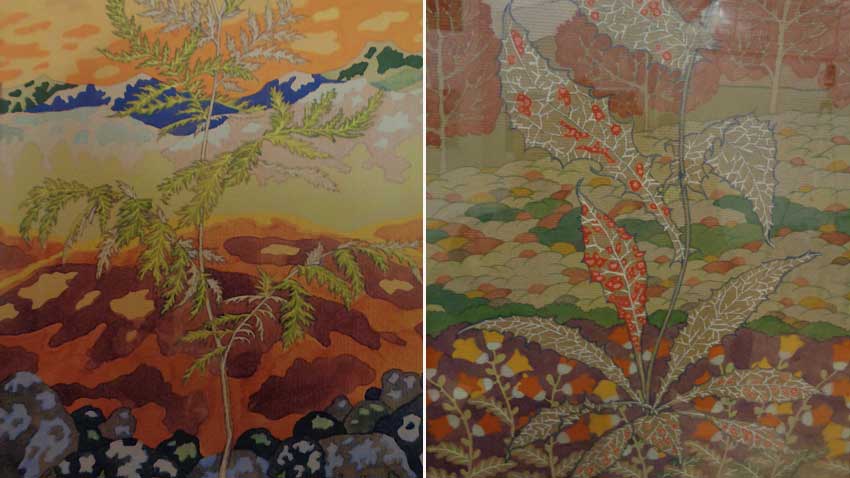A fascinating exhibition called Symbolic landscapes (on nature’s mysterious power) is on at the National Art Gallery until January 11. It is dedicated to the 125th anniversary of the birth of academician Nikolay Raynov – one of the most versatile figures in the history of Bulgarian culture; a man of letters writing in different genres, a critic of literature and the fine arts, an inspired artist and interpreter of Bulgarian and world folklore. He studied at the Theological Seminary, then philosophy but ultimately graduated graphic art.
“Nikolay Raynov is a figure of encyclopedic interests that would be difficult to compare with anyone else, especially in the sphere of visual arts in which he was both historian and researcher. These interests throw a bridge to the spiritual nature of art,” says in an interview for Radio Bulgaria art critic Plamena Dimitrova-Racheva, curator of the exhibition. Some time ago, she read one of his manuscripts, part of the Raynov family archives kept by his grand-daughter Diana-Maria Raynova. The notebook in question starts with notes on the history of 11th century architecture. The pages that follow are entitled “The mysterious power of herbs. Occult medicinal plants and medicine men.”

“No one had ever connected Nikolay Raynov with the knowledge or practice of medicinal herbs. But this has proved to be a fascinating manuscript that sheds light on the ancient mythical use and symbolism of plants and herbs. And also – on their use in different religious mysteries in the ancient world. We know Nikolay Raynov to have been interested in astrology, we know he had a deep knowledge of theosophy (the mystical insight into the nature of God). He was among the founders of the theosophical society in 1930. And in truth, this manuscript provides a very different knowledge of herbs that goes far beyond their mere practical application, preparation or medicinal properties,” says Plamena Dimitrova-Racheva.
In her words, the notebook brings attention to his landscapes of wild flowers. A collection called Nikolay Raynov – ambassador of light, featuring a great many reproductions was released to mark his anniversary. In fact, he had often drawn herbs – for example to illustrate a textbook on phytotherapy. They can be seen as reproductions but no one knows where the originals are. And Plamena Dimitrova-Racheva found out that the wild flower landscapes belonged to different galleries in Bulgaria, or were in private collections. Brought together in one exhibition, these works are connected, literally and visually with Nikolay Raynov’s manuscript, she says. Medicinal plants are in the foreground with grass, hills, clouds in the background.

“Nikolay Raynov’s manuscript is an in-depth study which I found fascinating because this was the first time I had read anything about the communities of plants,” Plamena Dimitrova-Racheva goes on to say. “Nikolay Raynov writes about the sentient life of plant cells, because they know what element they need as nourishment for their development, how to co-exist with one another. And that is a very curious thing, because the picture one puts together on reading the manuscript is that everything in this world – from amebas to the larger organisms in the universe exist in an order governed by harmony. And that this order can be disrupted through stupidity or lack of understanding or that one can fit into it. And he adduces examples of people who have obtained this knowledge and have followed these laws of nature, delving into its mysterious powers.”
When a plant is under a given zodiac sign it will have certain components that determine its medicinal properties, Nikolay Raynov wrote in his manuscript. Here too you will find the story of how flowers came to be part of different coats of arms and what qualities each signifies.
English Milena Daynova
Photos: Veneta Pavlova
The ninth edition of the initiative Poetry in the Metro opens today and lasts until 23 December. The project was initiated by the Polish Cultural Institute in Sofia. It includes poems by 20 European writers. They will be displayed on panels..
Awakener/enlightener - a person who, through his actions, ideas or creative work, awakens the spirit of the people, preserves and spreads national identity, culture and education. In Bulgarian history, this term is most often associated with the period of..
For the twenty-third year, the Bansko Film Fest team will take the audience to some of the most extreme corners of the world with 75 films from 39 countries . ''All of them are premieres, and for some of them, the screenings in Bansko will be..
World-famous opera singer Sonya Yoncheva has received the "Musician of the Year, 2023" award. It was presented to her by BNR Director General Milen..
Romanian President Klaus Iohannis awarded maestro Nayden Todorov the Order of Cultural Merit in the rank of Grand Officer, Category F - Promoting..

+359 2 9336 661
